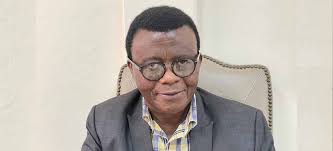
Audio By Carbonatix
Former UN Senior Governance Advisor, Prof Baffour Agyeman-Duah, has called for a thorough reassessment of Africa's democratic systems.
He argues that the current form of democracy practiced in many African countries fails to deliver true independence and freedom, essential components of a genuine democracy.
In an interview with Joy News on Monday, Prof Agyeman-Duah reflected on the optimism that swept across Africa in the early 1990s following prolonged periods of dictatorship and military rule. “We were euphoric about the democratic changes that began in the early 90s, not just in Ghana but across the continent," he recalled. However, he noted that after three decades, significant challenges have emerged that require urgent attention.
“After 30 years of practicing democracy, we face serious challenges that need to be addressed. We must inject new energy and vigour into our democratic processes,” Prof Agyeman-Duah stated.
He stressed that while democracy is not a perfect form of government, it remains the best available option. Therefore, the focus should be on improving the practical aspects of democracy rather than questioning its principles. “The principles of democracy, such as liberty and freedom, are universally cherished. However, we need to rethink how we practice democracy in Africa,” he said.
Prof Agyeman-Duah pointed out that the practice of democracy in Africa has been undermined by both monetary and political corruption. “You have leadership that is insensitive to the people's needs; to certain critical development element that we need to address and you are not getting attention, “he explained.
He cited recent events in Kenya as an example, noting that many young people have grown disillusioned with their leaders, who they feel have compromised their future through reckless policies.
Looking ahead, Prof Agyeman-Duah urged Ghanaians to critically review their democratic practices by 2025 to ensure sustainable stability in the country.
He concluded by reflecting on the changing threats to democracy, “In the early 90s, we feared the military would be the main threat to democracy. Today, it is our political practices that pose the greatest risk.”
Latest Stories
-
Ghana is rising again – Mahama declares
3 minutes -
Firefighters subdue blaze at Accra’s Tudu, officials warn of busy fire season ahead
35 minutes -
New Year’s Luv FM Family Party in the park ends in grand style at Rattray park
39 minutes -
Mahama targets digital schools, universal healthcare, and food self-sufficiency in 2026
47 minutes -
Ghana’s global image boosted by our world-acclaimed reset agenda – Mahama
1 hour -
Full text: Mahama’s New Year message to the nation
1 hour -
The foundation is laid; now we accelerate and expand in 2026 – Mahama
1 hour -
There is no NPP, CPP nor NDC Ghana, only one Ghana – Mahama
1 hour -
Eduwatch praises education financing gains but warns delays, teacher gaps could derail reforms
2 hours -
Kusaal Wikimedians take local language online in 14-day digital campaign
2 hours -
Stop interfering in each other’s roles – Bole-Bamboi MP appeals to traditional rulers for peace
3 hours -
Playback: President Mahama addressed the nation in New Year message
3 hours -
Industrial and Commercial Workers’ Union call for strong work ethics, economic participation in 2026 new year message
5 hours -
Crossover Joy: Churches in Ghana welcome 2026 with fire and faith
5 hours -
Traffic chaos on Accra–Kumasi Highway leaves hundreds stranded as diversions gridlock
5 hours

